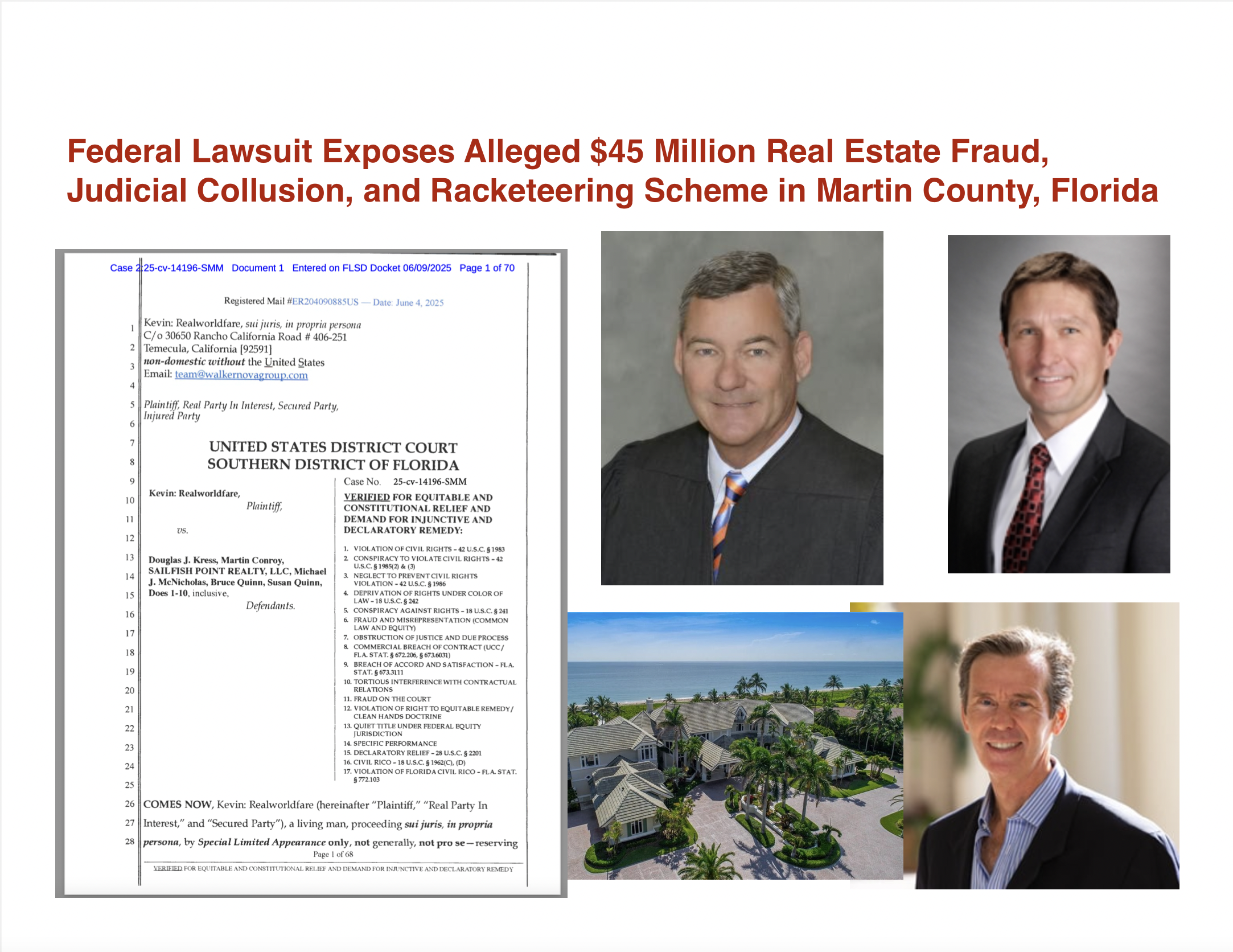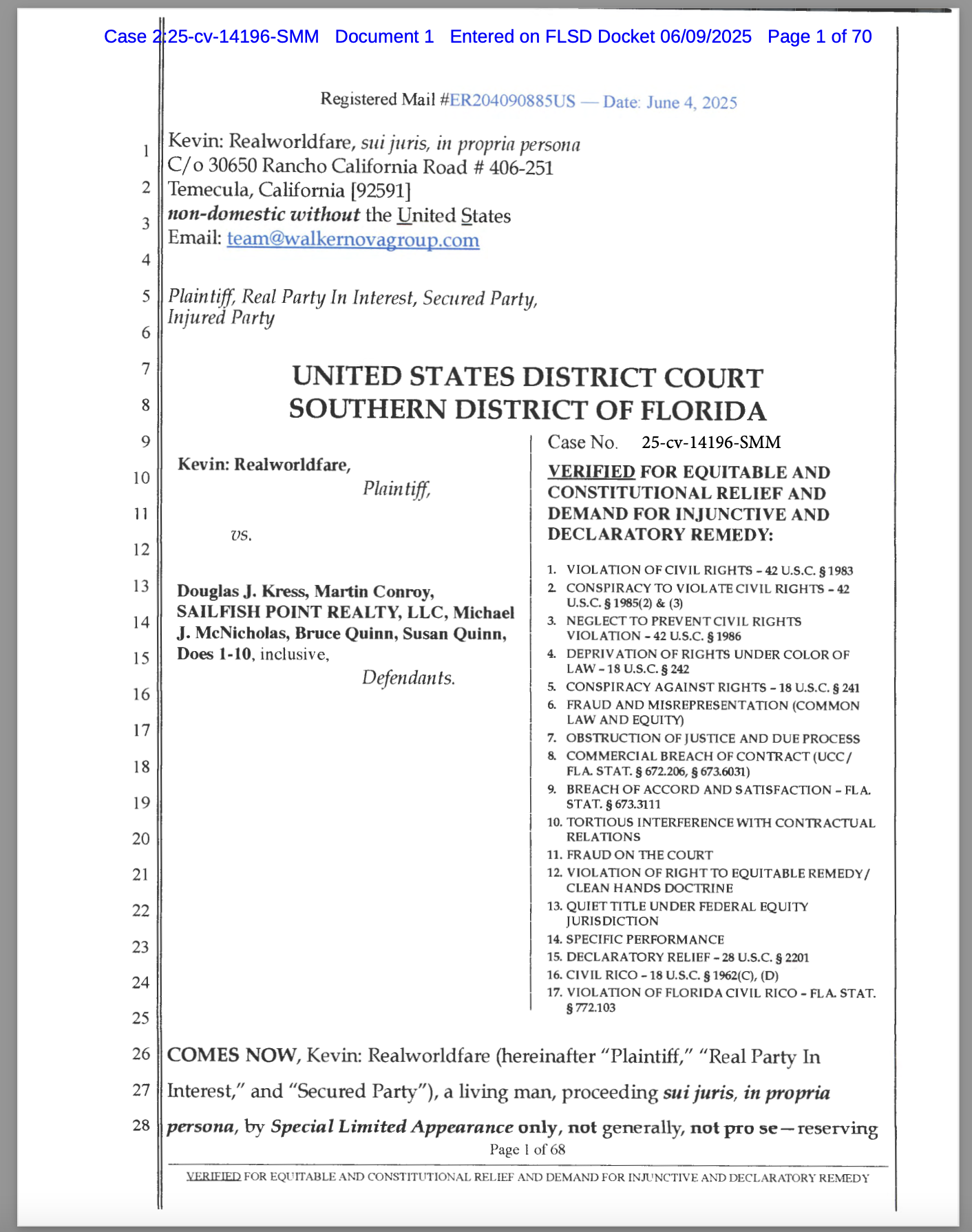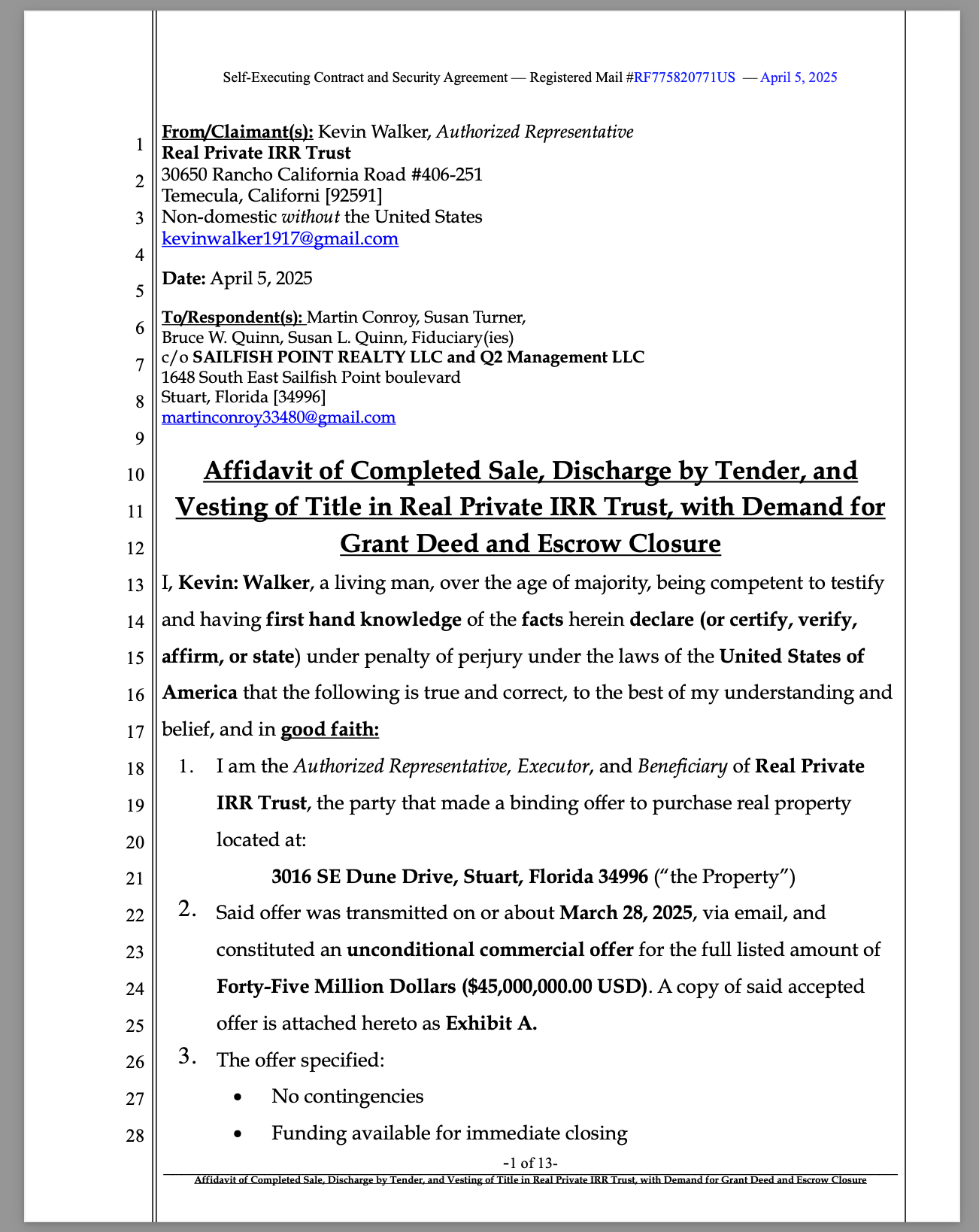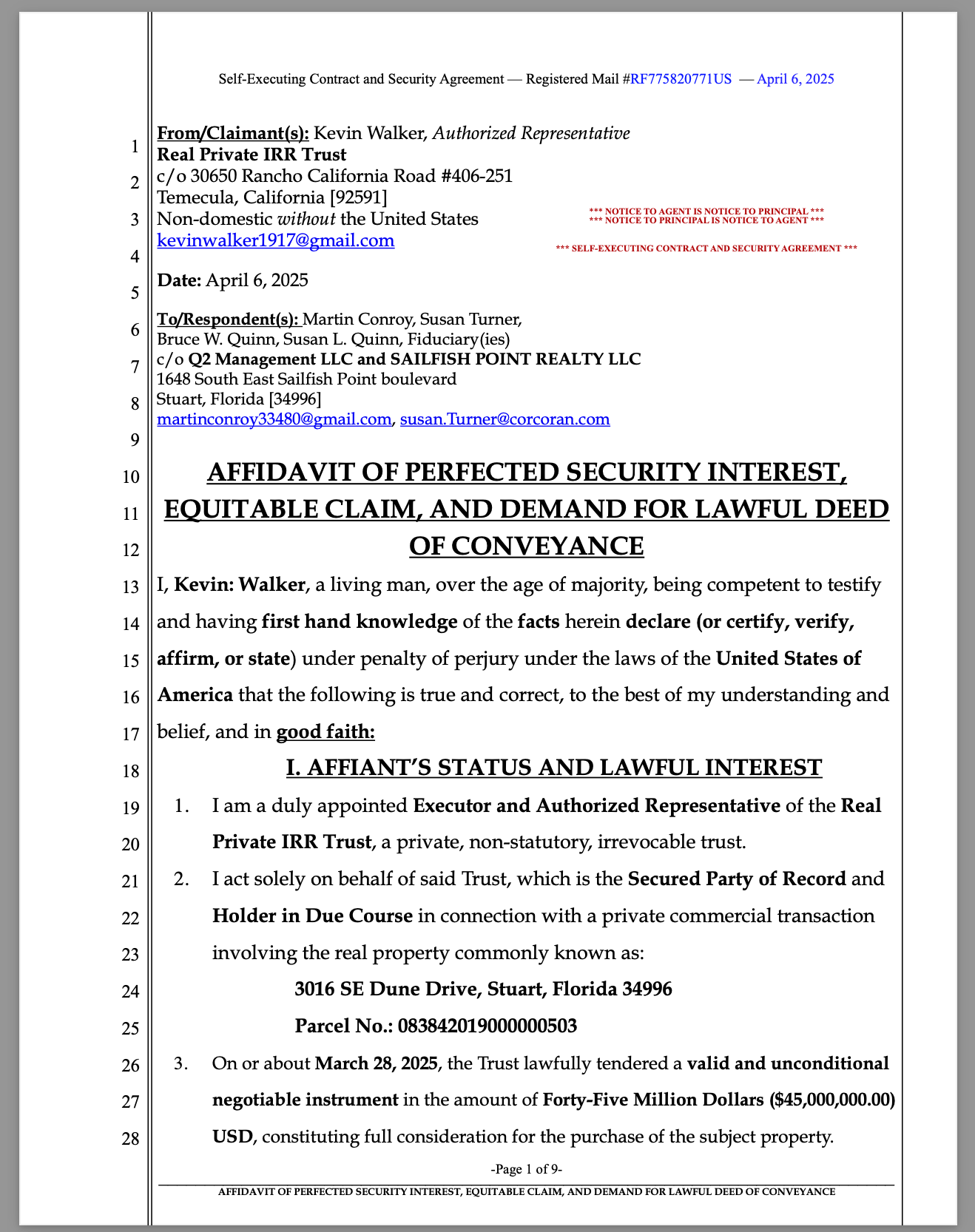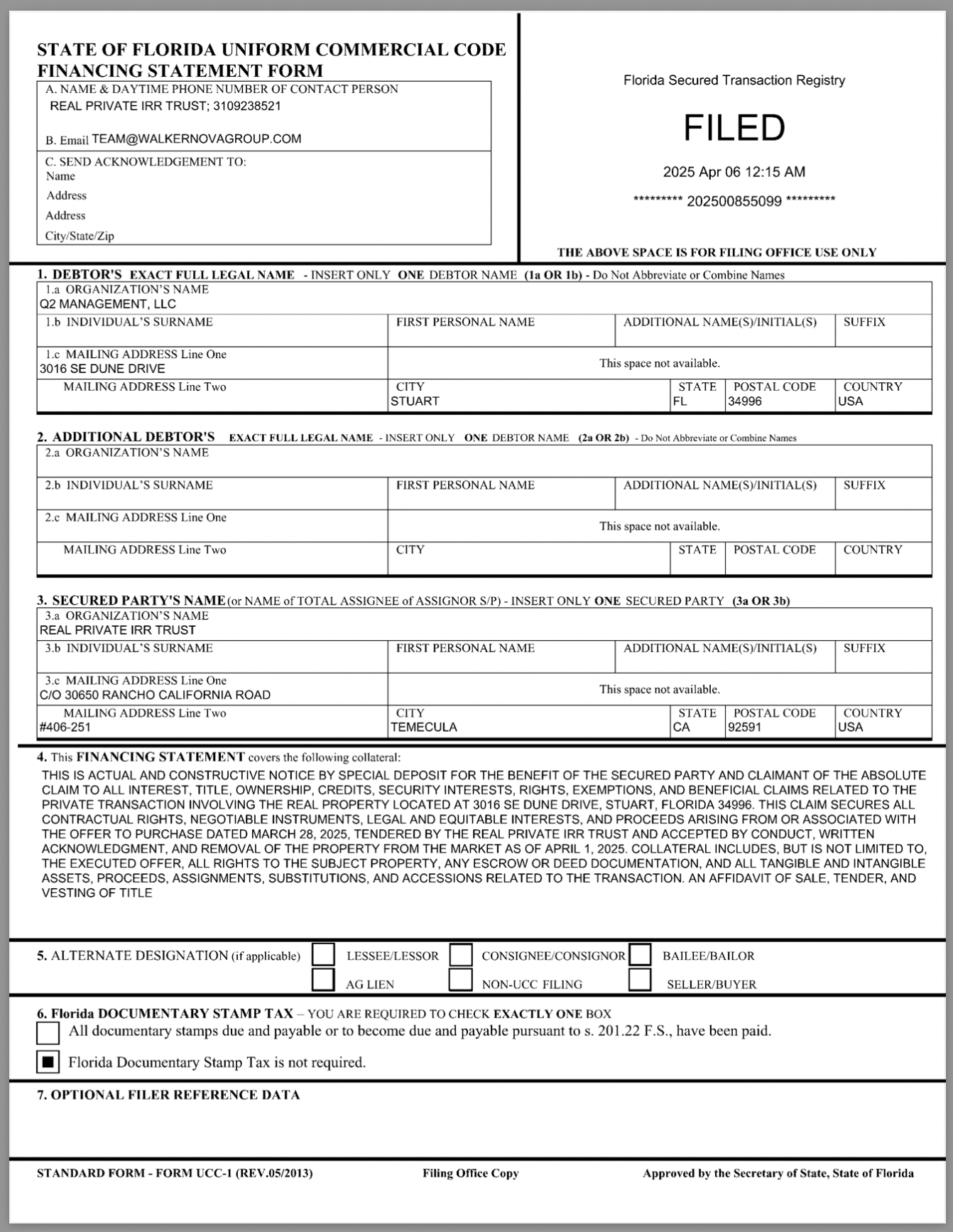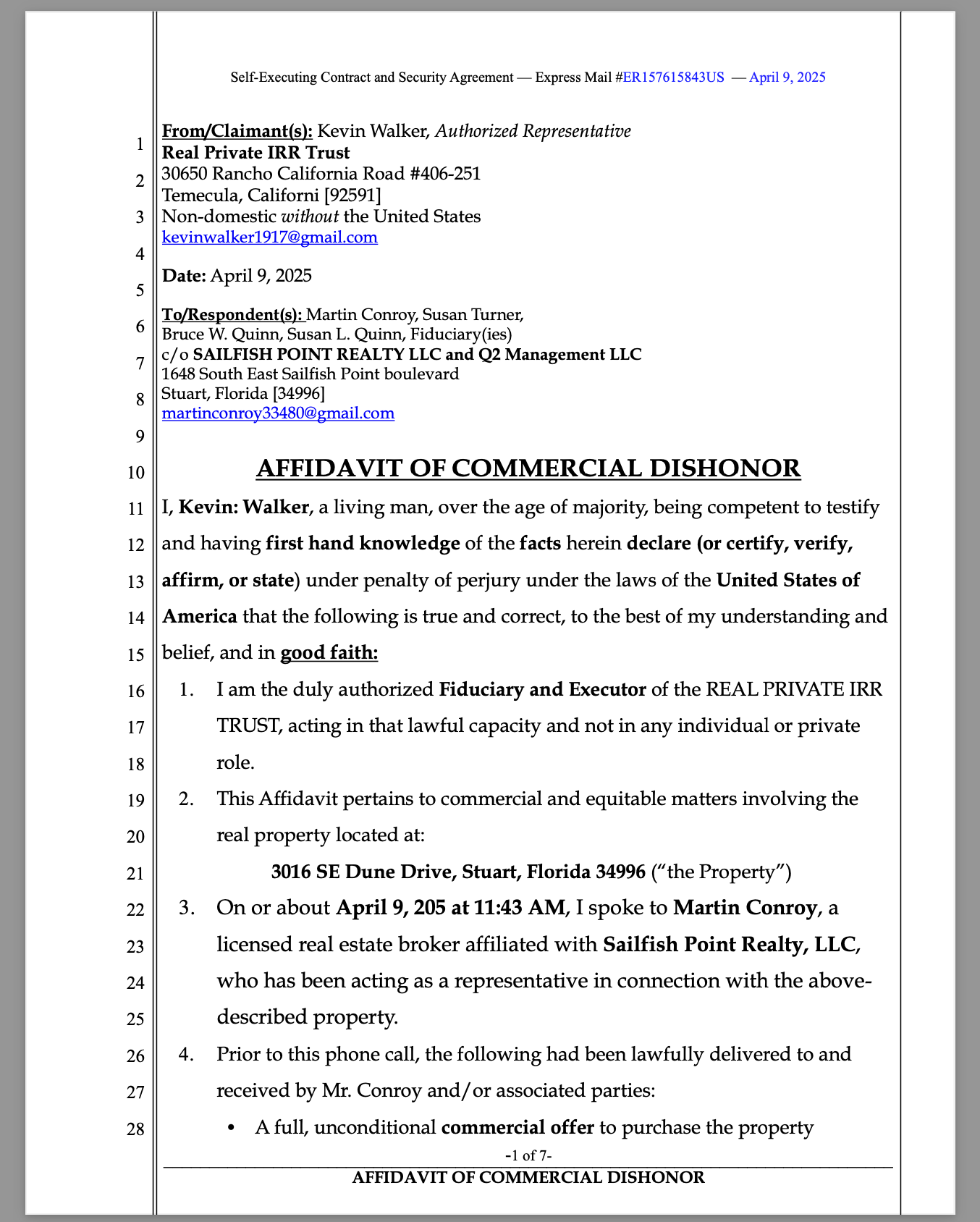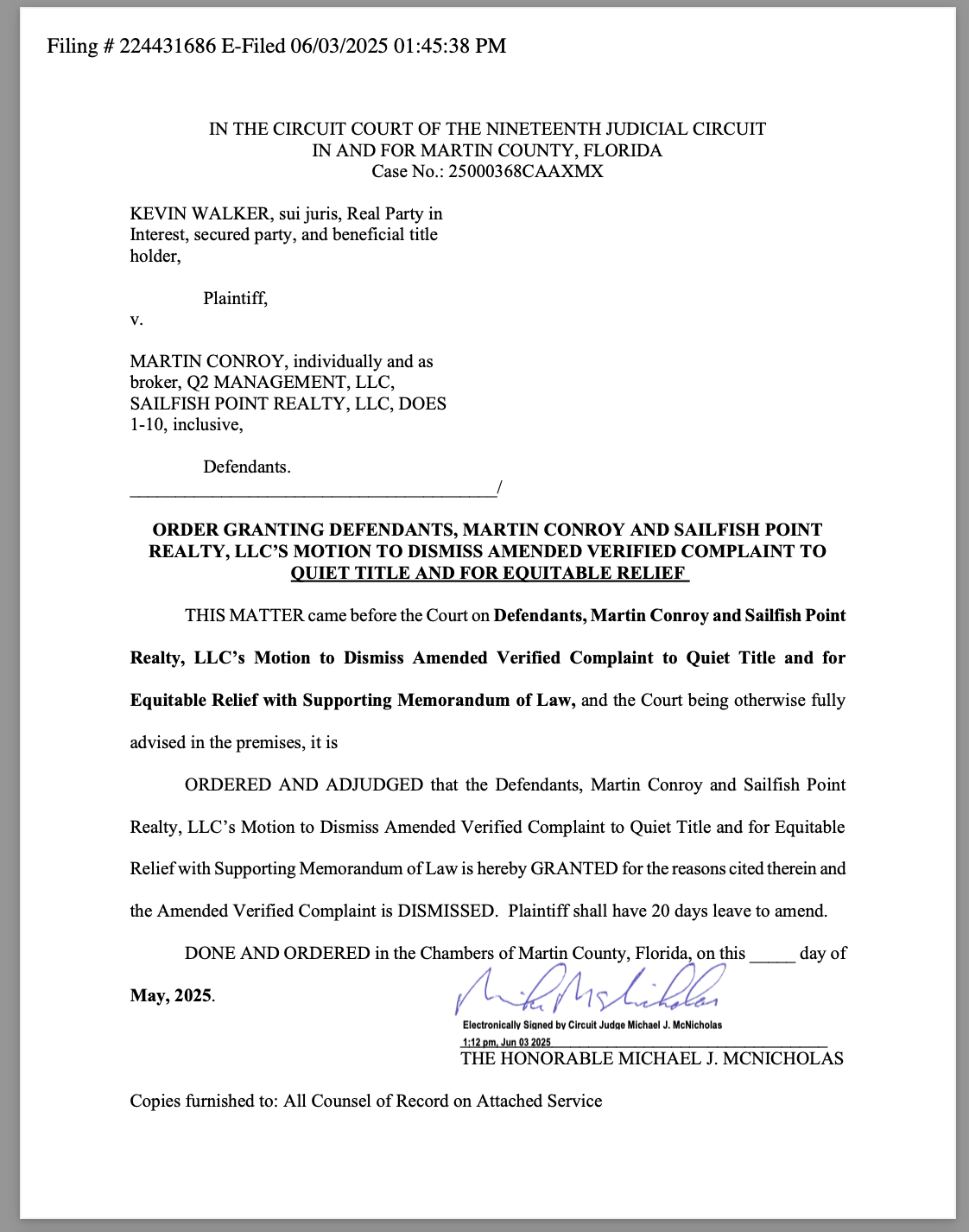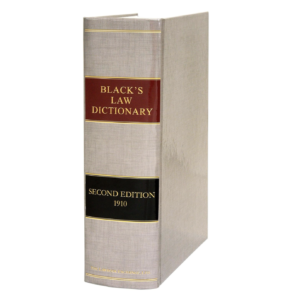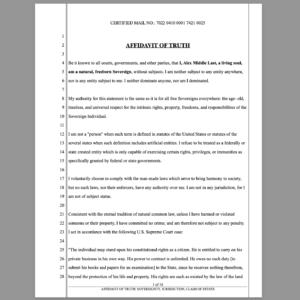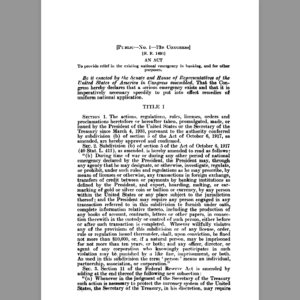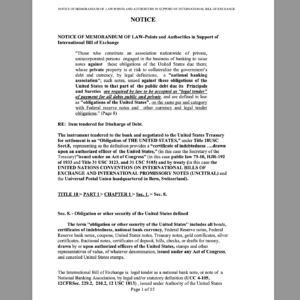Stuart, Florida — June 2025
A sweeping federal civil rights and equity lawsuit has been filed in the U.S. District Court for the Southern District of Florida, alleging a deliberate conspiracy involving fraud, deprivation of rights, and obstruction of justice by a sitting state judge, a BAR-licensed attorney, and a real estate brokerage. The Plaintiff, Kevin: Realworldfare, is seeking declaratory and injunctive relief, as well as over $45 million in damages, following what he describes as a coordinated effort to sabotage a lawful commercial transaction and dispossess him of real property in violation of federal and commercial law.
🏠 The Property at the Center of the Dispute
At issue is the property located at 3016 SE Dune Drive, Stuart, Florida, a luxury estate within the exclusive Sailfish Point community. On March 28, 2025, Plaintiff tendered a lawful negotiable instrument for $45 million, meeting all requirements under Fla. Stat. §§ 673.1041, 673.6031, and 673.3111. The Plaintiff asserts that the instrument was never rejected or rebutted, and that the seller’s broker — Martin Conroy of Sailfish Point Realty, LLC — removed the property from the market, confirming commercial acceptance by conduct.

📜 Verified Affidavits Ignored: Legal Default and Judicial Collusion Between Kress and Judge McNicholas
One of the most damning aspects of the federal lawsuit involves the systematic disregard of Plaintiff Kevin: Realworldfare’s verified affidavits and commercial filings, which, under both Florida law and the Uniform Commercial Code (UCC), carry the full force of law when unrebutted.
Over the course of multiple weeks, Plaintiff filed the following under penalty of perjury:
-
A Verified Affidavit of Perfected Security Interest, Equitable Claim, and Demand for Lawful Conveyance
-
A Verified Response to Strike Defective Motions
-
Notices of Default, Dishonor, and Opportunity to Cure
These filings were entered pursuant to UCC §§ 3-104, 3-302, 3-305, and 3-603, and their Florida codified equivalents:
-
Fla. Stat. § 673.1041 – Definition of negotiable instrument
-
Fla. Stat. § 673.3021 – Holder in due course
-
Fla. Stat. § 673.3051 – Defenses and claims in recoupment
-
Fla. Stat. § 673.6031 – Tender of payment; effect of refusal
-
Fla. Stat. § 673.3111 – Accord and satisfaction by use of instrument
Under law, once a party tenders a valid negotiable instrument and supports it with verified commercial affidavits, the burden shifts to the opposing party to rebut with a verified denial or admissible evidence. That never occurred.
Instead, Douglas J. Kress, a licensed Florida attorney, submitted a procedurally defective and legally void motion to dismiss, unverified, unsworn, and absent any jurisdictional foundation. Rather than require strict compliance or address the unrebutted record, Judge Michael J. McNicholas summarily rubber-stamped the dismissal—with no court seal, no evidentiary hearing, and no legal justification on the record.
This constitutes fraud upon the court, denial of due process, and a simulated legal process in violation of Plaintiff’s rights under:
-
42 U.S.C. § 1983 – Civil rights violations
-
18 U.S.C. §§ 241, 242 – Conspiracy and deprivation of rights
-
Fla. Stat. § 817.535(8)(b) – False or fraudulent filing affecting real property
⚖️ Unrebutted = Admitted. Facts Already Became Judgment.
Under Federal Rule of Civil Procedure 8(b)(6) and Florida civil procedure, any verified statement not rebutted stands as admitted:
“Averments in a pleading to which a responsive pleading is required are admitted when not denied.”
– Fed. R. Civ. P. 8(b)(6)“Silence can only be equated with fraud where there is a legal or moral duty to speak.”
– U.S. v. Tweel, 550 F.2d 297 (5th Cir. 1977)
Plaintiff asserts that, having fulfilled the requirements of tender, presentment, and verified commercial declarations, and receiving no rebuttal, the matter is already adjudicated in equity and law by default. Title has vested by operation of law, and the dismissal issued by McNicholas is null and void, having no jurisdictional foundation and executed in gross judicial bad faith.
The Plaintiff now moves for final judgment based on unrebutted verified filings, estoppel by acquiescence, and procedural default, demanding immediate quiet title, removal of cloud, and injunctive relief barring further obstruction.
⚖️ Key Allegations: Judicial Collusion and Legal Sabotage
The lawsuit centers not only on the real estate transaction but on the alleged judicial and legal fraud that followed. Plaintiff names Judge Michael J. McNicholas of the Florida Circuit Court as a central figure in the conspiracy. Despite receiving unrebutted affidavits, verified notices, and a perfected UCC security interest, Judge McNicholas granted a procedurally defective and factually unsupported motion to dismiss without an evidentiary hearing or jurisdictional inquiry.
According to the Complaint, Judge McNicholas acted outside his judicial authority, colluding with private parties and shielding a fraudulent conveyance scheme, thereby stripping the Plaintiff of property rights under color of law. The Plaintiff invokes the Clearfield Doctrine, asserting that once McNicholas engaged in private, commercial acts, he ceased to act on behalf of the State and lost all judicial immunity.

Jurisdictional Failure, Procedural Fraud, and Void Dismissal by Judge Michael J. McNicholas
Although the Quiet Title action was initially filed in the Florida Circuit Court under Judge Michael J. McNicholas, the court ultimately lost lawful jurisdiction and acted ultra vires for multiple reasons grounded in both commercial and constitutional law.
Plaintiff, Kevin: Realworldfare, tendered a lawful negotiable instrument in full satisfaction for the real property located at 3016 SE Dune Drive, Stuart, Florida, and subsequently filed a series of verified affidavits, notices of tender, perfected UCC security interests, and commercial declarations, all executed under penalty of perjury. These filings were supported by Florida’s codified UCC provisions, including but not limited to:
-
Fla. Stat. § 673.1041 – Negotiable instruments;
-
Fla. Stat. § 673.3021 – Holder in due course;
-
Fla. Stat. § 673.6031 – Tender of payment discharges obligation;
-
Fla. Stat. § 672.206 – Acceptance by conduct and silence.
At no point did any Defendant submit a verified denial, rebuttal affidavit, or admissible evidence to contest the Plaintiff’s filings. Under long-settled law, including Fed. R. Civ. P. 8(b)(6) and binding commercial principles, unrebutted verified affidavits stand as facts in evidence and become the judgment. At that point, jurisdiction was stripped, and the matter became one of private contractual enforcement, outside the authority of a statutory court.
Despite this, Douglas J. Kress, attorney for the Defendants, submitted a facially void, unverified, and procedurally defective motion to dismiss, lacking jurisdictional support and failing to contest any material facts. Rather than strike the motion or demand proper verification, Judge McNicholas unlawfully issued a rubber-stamped dismissal, without:
Such action constitutes procedural fraud, deprivation of due process, and simulated legal process, particularly where the verified filings had already discharged the obligation and transferred equitable title under Fla. Stat. §§ 673.6031(1) and 673.3111. The judge’s refusal to rule upon the unrebutted facts and his acceptance of a void filing amounts to judicial collusion and a breach of oath, removing any presumption of jurisdiction.
Additionally, under the Clearfield Doctrine (Clearfield Trust Co. v. United States, 318 U.S. 363), once a judge acts commercially—outside of adjudicating verified facts or engaging in lawful judicial conduct—he forfeits sovereign immunity and jurisdiction, and may be held liable as a private actor.
Therefore, the dismissal issued by Judge McNicholas is void ab initio, lacking subject matter jurisdiction, personal jurisdiction over the unrebutted verified record, and judicial immunity. The Plaintiff now demands that this void order be vacated and that judgment be entered in accordance with the verified record, unrebutted affidavits, and perfected equity interest, all of which stand as final under operation of law.
👨⚖️ Attorney Douglas J. Kress Accused of Orchestrating Fraud on the Court
The lawsuit further alleges that Douglas J. Kress, an attorney licensed in Florida, knowingly filed a facially void motion to dismiss without verification, affidavit, or jurisdiction. Plaintiff asserts that Kress acted in bad faith, misrepresented procedural posture, and deliberately suppressed Plaintiff’s verified filings — all in coordination with Judge McNicholas and Sailfish Point Realty to evade contractual and commercial obligations.
The Plaintiff characterizes Kress’s conduct as legal sabotage, civil conspiracy, and obstruction, invoking liability under 42 U.S.C. §§ 1983, 1985, 1986, and predicate fraud offenses under 18 U.S.C. §§ 241, 242, 1341, and 1962 (RICO).

🏢 Sailfish Point Realty, LLC Implicated in Racketeering Claims
Sailfish Point Realty, LLC, named as a defendant and employer of broker Martin Conroy, is accused of actively participating in the fraudulent transaction, including retaining the instrument without performance, failing to rebut affidavits, and concealing material facts about the contractual acceptance. The Plaintiff argues that the company profited from the deception and must be held liable under respondeat superior and Florida Civil RICO (Fla. Stat. § 772.103).

⚠️ Relief Demanded by Plaintiff Kevin: Realworldfare
The lawsuit demands:
-
Quiet Title and Declaratory Judgment establishing Plaintiff’s superior interest
-
Restoration of Deed and Possession
-
Permanent Injunctive Relief barring further commercial trespass
-
Compensatory and Treble Damages exceeding $45 million
-
Punitive Damages for intentional fraud and conspiracy
-
Federal intervention to vacate the state court’s unlawful dismissal
